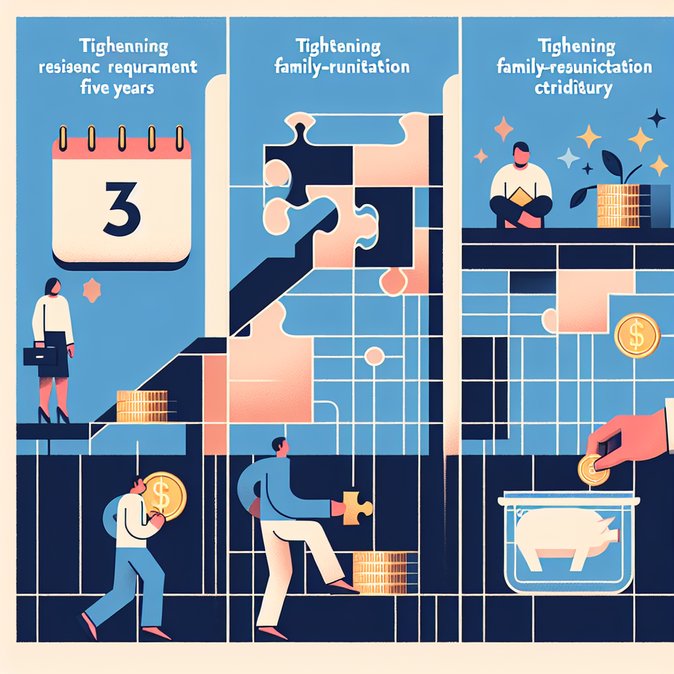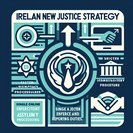
The Irish Government is preparing the most sweeping changes to the State’s international-protection system in two decades. According to briefing papers due before Cabinet this week, Justice Minister Jim O’Callaghan will table three separate memoranda that, taken together, are designed to speed up decisions, deter unfounded claims and align Irish practice more closely with the forthcoming EU Asylum & Migration Pact.
The headline change is a proposal to lengthen the residence period a refugee must build up before qualifying for naturalisation. At present most refugees can apply for Irish citizenship after three years’ lawful residence; the new plan would extend that to five years and introduce additional tests of financial self-sufficiency and good standing on social-welfare payments for at least two of those years. Applicants found to have previously lived in the State without permission could be ruled permanently ineligible.
![Ireland plans major overhaul of asylum, citizenship and family-reunification rules]()
Family-reunification rights would also tighten. Refugees and subsidiary-protection beneficiaries would have to show they can house and support the relatives they want to bring to Ireland. Anyone who has drawn social-welfare payments within three years of obtaining protection status—or who has outstanding public debts—would be barred from sponsoring relatives, while employment-permit holders would be restricted to spouses/partners, minor children and medically-dependent relatives only.
A third memo seeks Cabinet approval to make working asylum seekers pay a weekly contribution—likely to range from €15 to €238—toward the cost of their State-provided accommodation. Officials argue that the contribution mirrors systems in the UK and several EU countries and could save the Exchequer up to €55 million a year. The move comes amid a notable drop-off in new protection applications—from more than 45,000 in 2023-24 to roughly 27,000 so far in 2025—giving the Government political space to replace emergency IPAS centres with a more “sustainable” model.
Business-mobility specialists warn that the package, while politically popular, may have unintended consequences. Companies that rely on the Critical-Skills Employment Permit route fear stricter family rules could hamper their ability to attract senior talent in a competitive global market. On the other hand, faster processing times and clearer rules should reduce legal uncertainty for employers and applicants alike. If Cabinet signs off, draft legislation is expected to appear in early 2026—just months before the EU Pact becomes directly applicable.
The headline change is a proposal to lengthen the residence period a refugee must build up before qualifying for naturalisation. At present most refugees can apply for Irish citizenship after three years’ lawful residence; the new plan would extend that to five years and introduce additional tests of financial self-sufficiency and good standing on social-welfare payments for at least two of those years. Applicants found to have previously lived in the State without permission could be ruled permanently ineligible.

Family-reunification rights would also tighten. Refugees and subsidiary-protection beneficiaries would have to show they can house and support the relatives they want to bring to Ireland. Anyone who has drawn social-welfare payments within three years of obtaining protection status—or who has outstanding public debts—would be barred from sponsoring relatives, while employment-permit holders would be restricted to spouses/partners, minor children and medically-dependent relatives only.
A third memo seeks Cabinet approval to make working asylum seekers pay a weekly contribution—likely to range from €15 to €238—toward the cost of their State-provided accommodation. Officials argue that the contribution mirrors systems in the UK and several EU countries and could save the Exchequer up to €55 million a year. The move comes amid a notable drop-off in new protection applications—from more than 45,000 in 2023-24 to roughly 27,000 so far in 2025—giving the Government political space to replace emergency IPAS centres with a more “sustainable” model.
Business-mobility specialists warn that the package, while politically popular, may have unintended consequences. Companies that rely on the Critical-Skills Employment Permit route fear stricter family rules could hamper their ability to attract senior talent in a competitive global market. On the other hand, faster processing times and clearer rules should reduce legal uncertainty for employers and applicants alike. If Cabinet signs off, draft legislation is expected to appear in early 2026—just months before the EU Pact becomes directly applicable.









